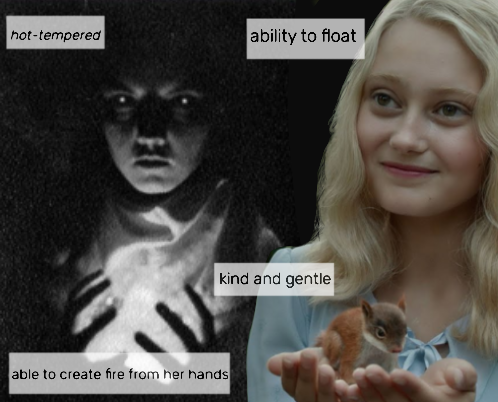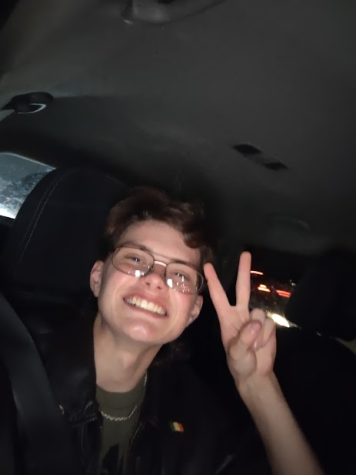Book to Movie Adaptations Are Killing Two Industries

Book vs Movie description of same chracater
January 27, 2023
“My life’s work going through a meat grinder.” stated Percy Jackson author Rick Riordan in reference to the infamous movies inspired by his writing, fans of his work were quick to agree. Hatred and disappointment for book adaptations is not specific to Percy Jackson but most if not all book-to-movie franchises. Such sentiments don’t halt the makings of these films, however with profits of the scandalous cinema often in the range of millions to billions and occasionally good ratings despite fanatic outroar. Contrary to popular belief, the practice of making books into movies is not new in the film industry as features have been recreating famous literature, centuries before the likes of Disney and Harry Potter; the first recorded adaptation being the 1899, Georges Méliès’ Cinderella, only five years after the film video camera was made. One question seems to remain unanswered, why do long-term enthusiasts roll their eyes at the sight of an adaptation when it outright shows the growth of their interests? And more importantly, why do companies rehash old stories when moviegoers groan at the thought of another unoriginal flick?
It seems whenever a movie reviving a novel comes out, a gaggle of book nerds share their disdain at the mockery of their beloved fiction. A recent study only proves this belief as a reported 46% of surveyors stated that movies based on books will never top the source material, while nearly 25% declared movies ruin their favorite books, thus leaving only 21% of responses siding with these adaptations. Although media certainly tends to give voice to critiques over enjoyers, there is a definite amount of people who disregard films based off past titles. However, there is yet to be a definitive answer as to why. Many simply enjoy the writing as it gives the reader more power to imagine the characters and their environment, given they aren’t illustrated. Yet there is one overarching theme when one says, “The book was better.” and that is detail. Even the most ambitious of movies can’t seem to reach the level of detail and specificity that some literature can. This is because of the very fact of what movies are, they are not written accounts of a life but a life unfolding on screen, screenplay writers don’t tell, they show. Such an important factor of movies is the reason these adaptations are built to fail, they very rarely grasp such a hold on an audience as they show a story that is meant to be told.
All this considered, many would wonder why there are so many of these features after such a concrete opinion within these groups. One possibility is that these directors legitimately enjoy the book/s they base their movies after and hope to recreate their enjoyment for a wider audience. Another, more likely reason is summed up in a single word, money. Although there are definitely great adaptations with only the best interests in mind, a majority of the recreations are made with the intent of using an already popular namesake to garner more attention to their films. Despite the fact there is yet to be a director who clearly stated this, there is a plain difference in motivation that can be felt by simply watching the film with previous knowledge of the literature behind it. Movies such as Trainspotting and We Need to Talk About Kevin have an explicit love of their cited publications and take their own spin on the storylines or settings to better present the purpose of the narrative, or even show in a distinct light, one that was not shed in the initial fiction. However for every genuine reprisal, there are seven cop-outs. Motion pictures like, 2017 The Dark Tower and 2016 Miss Peregrine’s Home for Peculiar Children, both of which seem embarrassed of their source material and try to jam in plot where it doesn’t fit, even going as far to brutalize the characters that made each novel so special. Yet, regardless of these failures in the eyes of fans, these movies repeatedly make millions of dollars over their budget in box office because producers know people familiar with these franchises will watch it, whether out of love or hate. Said thought-process is the defining point of “All press is good press”. The worst part of this pattern in filmmaking is not even the atrocious representation of modern best-sellers, but the reputation of the books as spectators with no prior knowledge of source material assume the adaptations hold a standard for what the book holds as well as the corporate greed consuming the film industry with each new J.K. Rowling spin-off.
In such a world the only chance we as an audience have to halt the blasphemy that is book-to-movie adaptations and subsequently save the reputation of both industries as a form of art and entertainment is to stop watching and giving attention to bad movies. Whether they be remakes or original, bad movies are profiting on hate-watchers as the form of art that is cinematography dies with each new cornucopia Marvel movie poster. And with each new adaptation, those who aren’t one to read lose their respect for books based on their modernized remake. Ultimately the choice is impossible to finalize as film addicts run to each theater showing, but perhaps if enough people can wait until the feature makes its way to streaming, the box office and therefore studio will receive the message.

